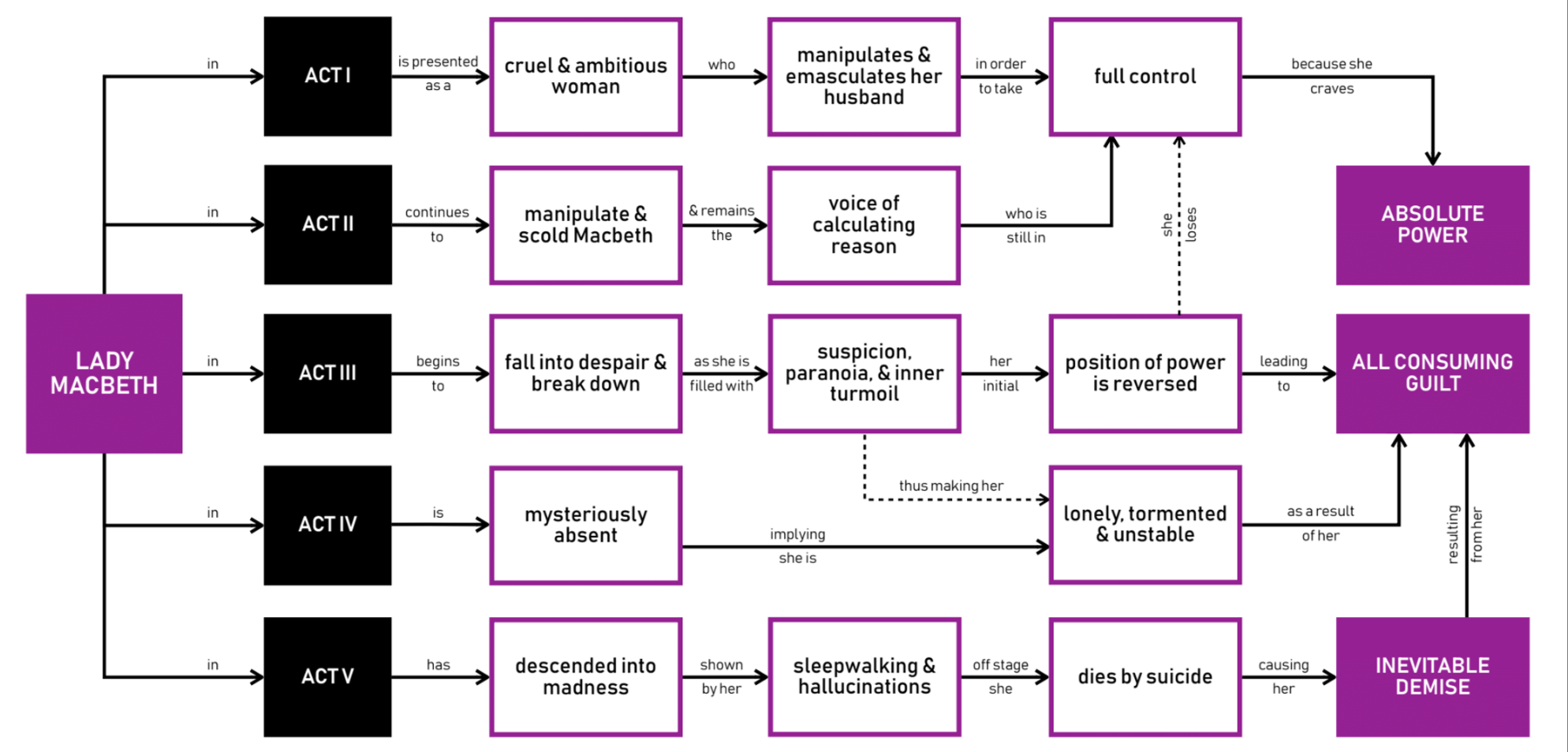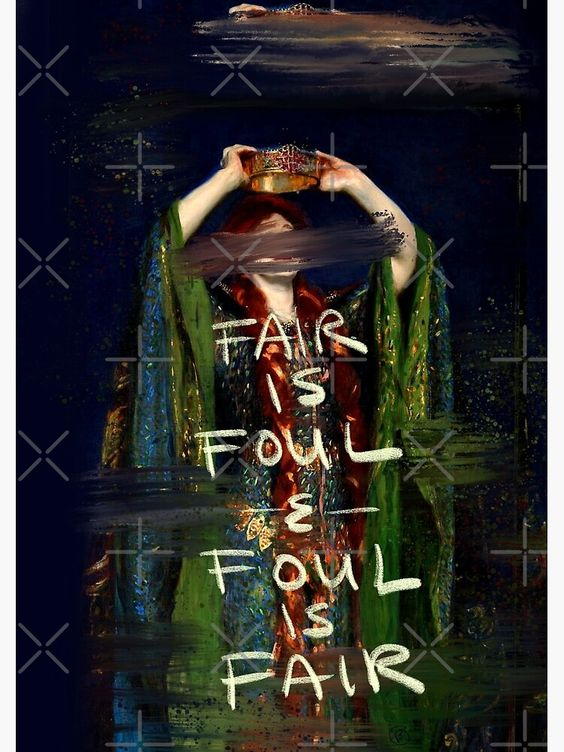Photo AI
Last Updated Sep 26, 2025
Lady Macbeth Simplified Revision Notes for Leaving Cert English
Revision notes with simplified explanations to understand Lady Macbeth quickly and effectively.
238+ students studying
Lady Macbeth
Lady Macbeth's Character Journey
- Lady Macbeth's journey is a tragic descent from a powerful and ambitious manipulator to a guilt-ridden, madwoman who ultimately takes her own life.
- Initially, she is the driving force behind Macbeth's actions, but as the play progresses, her control diminishes, and she becomes consumed by the guilt of their deeds.

Act I: The Ambitious Manipulator
1. Introduction as a Cruel and Ambitious Woman:
- Lady Macbeth is introduced as a woman of immense ambition and cruelty.
- Upon reading Macbeth's letter, she resolves to push him towards seizing the throne.
"Glamis, thou art; and Cawdor; and shalt be / What thou art promised." (Act 1, Scene 5)
"Yet do I fear thy nature; / It is too full o' the milk of human kindness / To catch the nearest way." (Act 1, Scene 5)
2. Manipulation and Emasculation of Macbeth:
- Lady Macbeth manipulates and emasculates Macbeth, urging him to seize the throne.
- She questions his manhood and resolve, pushing him towards committing regicide.
"When you durst do it, then you were a man." (Act 1, Scene 7)
"False face must hide what the false heart doth know." (Act 1, Scene 7)
Act II: Ruthlessness and Control
1. Manipulate and Scold Macbeth:
- Lady Macbeth continues to manipulate and scold Macbeth, maintaining control over him.
- She remains the voice of calculating reason as Macbeth begins to waver.
"Give me the daggers: the sleeping and the dead / Are but as pictures." (Act 2, Scene 2)
"A little water clears us of this deed." (Act 2, Scene 2)
Act III: Despair and Breakdown
1. Fall into Despair and Breakdown:
- Lady Macbeth begins to fall into despair and break down.
- Filled with suspicion, paranoia, and inner turmoil, her initial position of power is reversed.
"Nought's had, all's spent, / Where our desire is got without content." (Act 3, Scene 2)
"What's done cannot be undone." (Act 3, Scene 2)
Act IV: Absence and Implied Madness
1. Mysteriously Absent:
- In Act IV, Lady Macbeth is mysteriously absent from the main action.
- This absence implies that she is becoming increasingly unstable and mentally deteriorated.
"She has light by her continually; 'tis her command." (Act 5, Scene 1, referencing her need for light, a symbol of her fear of darkness and guilt)
Act V: Madness and Demise
1. Descended into Madness:
- By Act V, Lady Macbeth has descended into madness.
- Her guilt manifests in sleepwalking and hallucinations, notably trying to wash imaginary bloodstains from her hands.
"Out, damned spot! out, I say!" (Act 5, Scene 1)
"Here's the smell of the blood still: all the / perfumes of Arabia will not sweeten this little / hand." (Act 5, Scene 1)
2. Death by Suicide:
- Lady Macbeth's mental state deteriorates to the point where she dies by suicide.
- Her tragic end underscores the ultimate consequences of her and Macbeth's ambition.
"The queen, my lord, is dead." (Act 5, Scene 5, indicating her off-stage death)
Character Analysis
- Ambitious
- Manipulative
- Ruthless
- Guilt-Ridden
- Ambitious
- Lady Macbeth's ambition is one of her most defining traits. She is driven by an intense desire for power and is willing to go to great lengths to see her husband ascend to the throne. This ambition is ignited upon reading Macbeth's letter about the witches' prophecies.
- She immediately resolves to spur Macbeth into action, demonstrating her willingness to embrace ruthlessness to achieve her goals. Lady Macbeth's ambition is evident when she calls upon the spirits to "unsex" her, asking them to fill her with cruelty and rid her of any feminine weakness that might hinder her from pursuing her ambitions.

"Come, you spirits / That tend on mortal thoughts, unsex me here, / And fill me from the crown to the toe top-full / Of direst cruelty!" (Act 1, Scene 5)
- Manipulative
- Lady Macbeth is highly manipulative, using her influence over Macbeth to drive him to commit regicide. She understands Macbeth's weaknesses and leverages them to manipulate him into following through with their plan to murder King Duncan.
- Her manipulation is most evident when she challenges Macbeth's masculinity and courage, pushing him towards the murder by insinuating that he would be more of a man if he carried out the deed.
"When you durst do it, then you were a man." (Act 1, Scene 7)
- Ruthless
- Lady Macbeth's ruthlessness is starkly evident in her planning and execution of Duncan's murder. She is unflinching in her resolve and dismisses any moral or ethical concerns that arise.
- Her cold-blooded nature is highlighted when she takes control of the situation, framing Duncan's guards for the murder without hesitation. While Macbeth is horrified and guilt-stricken after the murder, she remains focused on securing their position.
"Give me the daggers: the sleeping and the dead / Are but as pictures: 'tis the eye of childhood / That fears a painted devil." (Act 2, Scene 2)
- Guilt-Ridden
- Despite her initial ruthlessness, Lady Macbeth eventually succumbs to overwhelming guilt. The weight of her and Macbeth's actions begins to take a severe toll on her mental state.
- This descent into guilt-induced madness is most poignantly depicted in the sleepwalking scene, where she is seen trying to wash the imagined bloodstains from her hands.
- The once strong and ruthless Lady Macbeth is reduced to a tormented soul, haunted by the blood on her hands that she cannot wash away, symbolising the inescapable nature of her guilt.
"Out, damned spot! out, I say!—One: two: why, / then, 'tis time to do't.—Hell is murky!—Fie, my / lord, fie! a soldier, and afeard?" (Act 5, Scene 1)
Overview of Lady Macbeth's Relationships
Macbeth:
- Lady Macbeth begins as the dominant partner, pushing Macbeth to pursue his ambition without hesitation. She manipulates and emasculates him to achieve their shared goals.
- However, as the play progresses, the power dynamics shift. Macbeth becomes more independent and ruthless, while Lady Macbeth's guilt drives her to madness. Their relationship deteriorates, marked by distance and isolation.
"My dearest partner of greatness." (Act 1, Scene 5)
"Nought's had, all's spent, / Where our desire is got without content." (Act 3, Scene 2)
King Duncan:
- Lady Macbeth sees Duncan as an obstacle to Macbeth's rise to power. She orchestrates his murder, showing no remorse. However, the act becomes a significant burden on her conscience, leading to her eventual mental breakdown.
"The raven himself is hoarse / That croaks the fatal entrance of Duncan / Under my battlements." (Act 1, Scene 5)
Banquo:
- Lady Macbeth has little direct interaction with Banquo, but his existence poses a threat to their power. She supports Macbeth's decision to have Banquo murdered.
"What's done is done." (Act 3, Scene 2, after Banquo's murder)
Lady Macduff:
- Lady Macbeth's actions indirectly lead to the tragic fate of Lady Macduff and her children. Although they do not interact directly, Lady Macbeth's influence on Macbeth results in the slaughter of Macduff's family.
"The thane of Fife had a wife: where is she now? / What, will these hands ne'er be clean?" (Act 5, Scene 1, indicating her guilt over the murders)
Adjectives
| Adjective | Explanation |
|---|---|
| Ambitious | Lady Macbeth's overwhelming ambition drives her to push Macbeth into murdering King Duncan. |
| Manipulative | She skillfully manipulates Macbeth by questioning his manhood and resolve. |
| Ruthless | Lady Macbeth shows no hesitation or moral qualms in plotting Duncan's murder. |
| Unremorseful | Initially, she dismisses any guilt or fear following Duncan's murder, focusing on securing power. |
| Strong-willed | Her determination and resolve are evident as she orchestrates and controls the murder plot. |
| Authoritative | Early in the play, she takes charge in her relationship with Macbeth, directing his actions. |
| Tormented | Lady Macbeth is haunted by the imagined bloodstains on her hands, symbolizing her inescapable guilt. |
| Despondent | Her descent into madness reveals her desperation and inability to cope with the consequences of their actions. |
| Tragic | Lady Macbeth's journey from power to madness and her eventual suicide marks her as a deeply tragic character. |
Key Quotes for Lady Macbeth
- "Glamis, thou art; and Cawdor; and shalt be / What thou art promised." (Act 1, Scene 5)
- "Yet do I fear thy nature; / It is too full o' the milk of human kindness / To catch the nearest way." (Act 1, Scene 5)
- "When you durst do it, then you were a man." (Act 1, Scene 7)
- "False face must hide what the false heart doth know." (Act 1, Scene 7)
- "Give me the daggers: the sleeping and the dead / Are but as pictures." (Act 2, Scene 2)
- "A little water clears us of this deed." (Act 2, Scene 2)
- "Nought's had, all's spent, / Where our desire is got without content." (Act 3, Scene 2)
- "What's done cannot be undone." (Act 3, Scene 2)
- "She has light by her continually; 'tis her command." (Act 5, Scene 1)
- "Out, damned spot! out, I say!" (Act 5, Scene 1)
- "Here's the smell of the blood still: all the / perfumes of Arabia will not sweeten this little / hand." (Act 5, Scene 1)
- "The queen, my lord, is dead." (Act 5, Scene 5)
500K+ Students Use These Powerful Tools to Master Lady Macbeth For their Leaving Cert Exams.
Enhance your understanding with flashcards, quizzes, and exams—designed to help you grasp key concepts, reinforce learning, and master any topic with confidence!
370 flashcards
Flashcards on Lady Macbeth
Revise key concepts with interactive flashcards.
Try English Flashcards37 quizzes
Quizzes on Lady Macbeth
Test your knowledge with fun and engaging quizzes.
Try English Quizzes29 questions
Exam questions on Lady Macbeth
Boost your confidence with real exam questions.
Try English Questions27 exams created
Exam Builder on Lady Macbeth
Create custom exams across topics for better practice!
Try English exam builder148 papers
Past Papers on Lady Macbeth
Practice past papers to reinforce exam experience.
Try English Past PapersOther Revision Notes related to Lady Macbeth you should explore
Discover More Revision Notes Related to Lady Macbeth to Deepen Your Understanding and Improve Your Mastery
